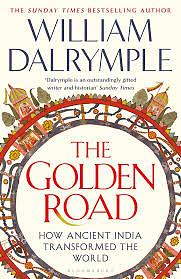Take a photo of a barcode or cover
India was a confident exporter of its diverse civilization, creating around it a vast empire of ideas. Indian art, religions, technology, astronomy, music, dance, literature, mathematics and mythology blazed a trail across the world, along a Golden Road that stretched from the Red Sea to the Pacific. My education has always been Western focused and I very much enjoyed seeing the world from another view. Indian ideas and of how Indian thought has had such an impact on the world.
Thank you NetGalley and Penguin Random House SEA! #LettersFromGaza #NetGalley.
informative
medium-paced
informative
medium-paced
This is a masterfully written account of the history of Indic ideas, culture, and customs, as well as how the region evolved and how India assisted in the evolution of neighboring regions. It is definitely worth re-reading !
adventurous
challenging
informative
inspiring
reflective
medium-paced
challenging
informative
medium-paced
adventurous
informative
medium-paced
The breadth and depth of time and subject matter covered by this remarkable history is huge. Its strength is in how it has been structured and edited to ensure it remains approachable and digestible despite this. I learned so much reading this that I knew nothing of before, and Dalrymple’s expertise not just as a historian (and I appreciated the extensive endnotes so much) but as an explorer who has actually been to the places he writes of creates a rich world in your imagination as you read. I did find myself aching for a bit more depth of analysis, which might be unfair given everything I’ve just said, but as a reader I couldn’t help but feel I was skating along the surface somewhat, never quite fully absorbed.
informative
slow-paced
Another 2025 read that has made me reconsider all I was taught about global history as well as providing answers to so many of my questions about elements of Western culture. A truly fascinating book, that rewards the perseverance and attention required.
challenging
slow-paced
(Note: I received an advanced reader copy of this work courtesy of NetGalley)
I have always had a special interest for any kind of history or nonfiction read that goes in-depth on how interconnected the ancient world was. On top of that, I’ve also carried something of a hyper specific fascination in all the ways that early Buddhism met with the Greco-Roman world and even blended at several different points of contact. As a result, I found myself quickly drawn into The Golden Road. I not only enjoyed the sections devoted to subjects such as the Kushan Empire and the art of Gandhara, topics that I already had a little bit of prior familiarity with, but I also liked learning in-detail about the array of other ways that India’s influence was felt from China, to across southeast Asia and into Europe.
However, I do feel the need to criticize this book in one area. I find that Dalrymple is a bit uneven in his coverage of the topic, with some areas getting what feels like an over-generous amount of attention. One prominent example that comes to mind is roughly midway through the book, when everything seems to be very narrowly focused upon the Chinese monk Faxian, and surrounding historical figures. And while his era was of course a major period of rapid spread and strong support for Buddhism in China, I felt like things had temporarily become micro-focused at the expense of the greater overarching narrative.
Still, I do appreciate the work overall. I do agree with Dalrymple’s general sentiment that India’s contributions to the ancient world tends to be heavily overlooked, and enjoyed having the ability to get a strong taste of just how far and how deeply many of the ideas, beliefs, and culture that originated on the subcontinent spread in one easily accessible read. Definitely one of major eye-opening history reads of the past year for me, and I am quite positive that many others will feel strongly likewise.
I have always had a special interest for any kind of history or nonfiction read that goes in-depth on how interconnected the ancient world was. On top of that, I’ve also carried something of a hyper specific fascination in all the ways that early Buddhism met with the Greco-Roman world and even blended at several different points of contact. As a result, I found myself quickly drawn into The Golden Road. I not only enjoyed the sections devoted to subjects such as the Kushan Empire and the art of Gandhara, topics that I already had a little bit of prior familiarity with, but I also liked learning in-detail about the array of other ways that India’s influence was felt from China, to across southeast Asia and into Europe.
However, I do feel the need to criticize this book in one area. I find that Dalrymple is a bit uneven in his coverage of the topic, with some areas getting what feels like an over-generous amount of attention. One prominent example that comes to mind is roughly midway through the book, when everything seems to be very narrowly focused upon the Chinese monk Faxian, and surrounding historical figures. And while his era was of course a major period of rapid spread and strong support for Buddhism in China, I felt like things had temporarily become micro-focused at the expense of the greater overarching narrative.
Still, I do appreciate the work overall. I do agree with Dalrymple’s general sentiment that India’s contributions to the ancient world tends to be heavily overlooked, and enjoyed having the ability to get a strong taste of just how far and how deeply many of the ideas, beliefs, and culture that originated on the subcontinent spread in one easily accessible read. Definitely one of major eye-opening history reads of the past year for me, and I am quite positive that many others will feel strongly likewise.
challenging
informative
slow-paced


